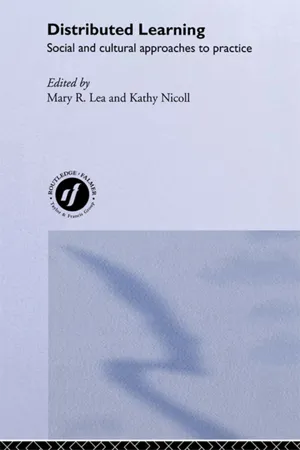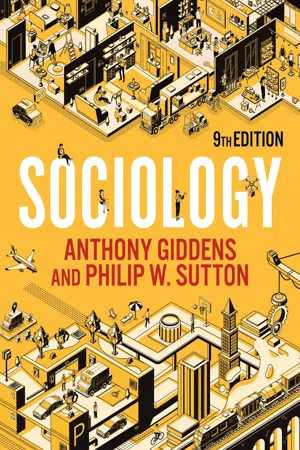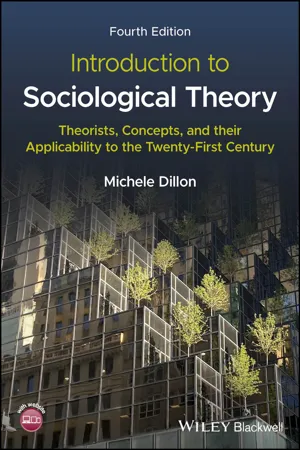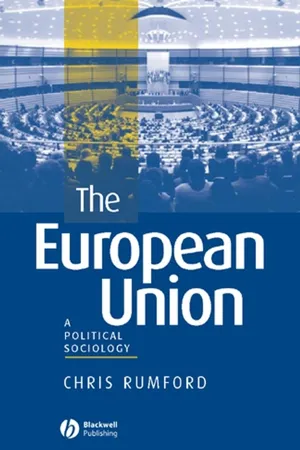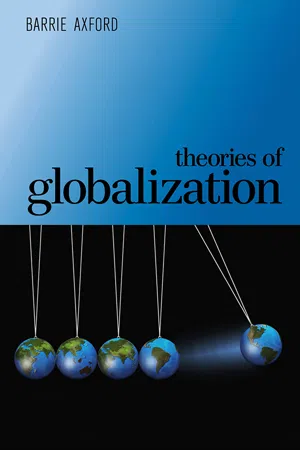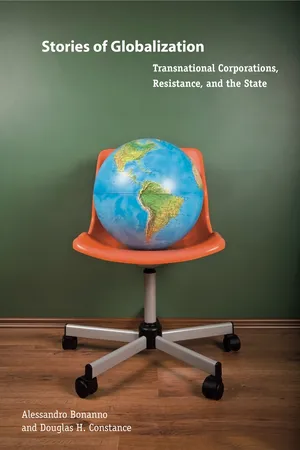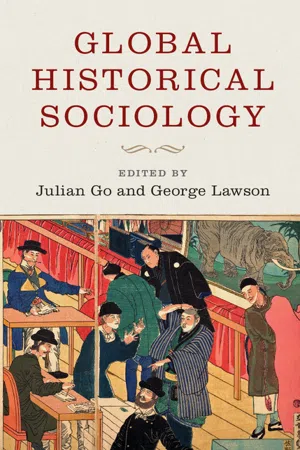Social Sciences
Globalisation in Sociology
Globalization in sociology refers to the interconnectedness and interdependence of societies and cultures on a global scale. It involves the exchange of ideas, goods, and information across borders, leading to the integration of economies and the spread of cultural influences. Sociologists study how globalization impacts social structures, power dynamics, inequality, and identity formation within and between societies.
Written by Perlego with AI-assistance
Related key terms
1 of 5
11 Key excerpts on "Globalisation in Sociology"
- eBook - ePub
Distributed Learning
Social and Cultural Approaches to Practice
- Mary R. Lea, Kathy Nicoll(Authors)
- 2013(Publication Date)
- Routledge(Publisher)
Until relatively recently, ‘the world’ was largely discussed either as an aspect of international relations or what is termed ‘world systems theory’. The former focuses on the relations between nation states, the latter on capitalist economic relations. Each has been subject to the criticism that their particular foci marginalise and exclude large and important trends in the world, in particular the cultural dimensions and the impact of information and communication technologies. In response to these limitations, different conceptions of globalisation have emerged that have stimulated debate about its nature, extent and novelty as a phenomenon, particularly in relation to the economy (Hirst and Thompson 1996a, b), but also in relation to politics and culture (Waters 1995; Edwards and Usher 2000).At its simplest, the notion of globalisation may be expressed as ‘the compression of the world and the intensification of consciousness of the world as a whole’ (Robertson 1992: 8) or, as Waters (1995: 3) suggests, ‘a social process in which the constraints of geography on social and cultural arrangements recede and in which people become increasingly aware that they are receding’. It signifies the shrinking of the world where people, services and goods are connected to each other across the globe through a variety of means and in increasingly immediate ways. Airline tickets bought in England are processed in India. CNN and McDonald's are available on a global scale. People migrate for work, leisure and increasingly as refugees. The Internet, fax and telephone put people instantly in touch with each other, even though they may be in different hemispheres. Investment decisions taken in one country may well affect workers and investors in several other countries. What in the past would have taken months to move around the globe now takes days or even seconds. The economic, political and cultural dynamics of these processes are the focus of much debate and dispute.Popular discussion of globalisation treats it as an entirely new phenomenon arising from the conditions of the immediate present. However, globalisation has a history and geography of its own. In this context, the contemporary interest in globalisation is the result of an intensification of certain processes and the awareness of the globe as a single environment. Robertson (1992), for example, provides one outline of the historical phases of the long, uneven and complicated process of globalisation. First, he identifies the Germinal Phase that lasted in Europe from the early fifteenth to the late eighteenth century. Although this is associated with the growth of national communities, it also embraces the spread of ideas about humanity and, perhaps more importantly, the Gregorian calendar, a step towards a global conception of time. The Incipient Phase lasted until the 1870s, once again mainly grounded in Europe, and saw the consolidation of the nation state and the development of international relations. The Take-Off Phase lasted until the mid-1920s, in which there were increasing global assumptions about what a nation state should be and how it should act. There was the implementation of ‘world time’, a sharp increase in the amount and speed of global communication, and a growth in global competitions, such as the Olympic Games. The mid-1920s to the late 1960s saw the Struggle for Hegemony Phase, particularly between the Second World War and the cold war adversaries seeking to determine the direction of the globalising processes in line with their own ideologies. The Holocaust and atom bomb provided defining perspectives on the prospects for humanity within this period. The current phase since the late 1960s is what Robertson (1992) terms the Uncertainty Phase, in which global consciousness has become heightened, with international systems more fluid, the prospects for humanity more fraught in the light of environmental and other risks, and with the increase in global communications and the consolidation of the global media. Alongside and in response to trends towards global integration, white, ‘western’ male assumptions that underlie dominant conceptions of humanity and society have been called into question by considerations of gender, sexual, ethnic and racial differences, the increased multiculturalism of societies and notions of the hybridity of cultures. - eBook - ePub
- Anthony Giddens, Philip W. Sutton(Authors)
- 2021(Publication Date)
- Polity(Publisher)
The concept of globalization is common currency in academic research, political debate, business strategy and the mass media. Yet, when the concept is invoked, it often refers to different things. For some, globalization is something like a political and economic project, pursued by elite groups in the Global North and aimed at promoting global trade to their own advantage. This is a version that provokes much anger and resistance. On the political right, globalization threatens and ultimately undermines precious national identities. On the left, globalization is often seen as a capitalist-led movement that plunders and exploits new regions, deepening inequalities and destroying good jobs in its wake (Crouch 2019a).For many sociologists, globalization refers to a set of largely unplanned processes, involving multidirectional flows of things, people and information across the planet (Ritzer 2009). However, although this definition highlights the increasing fluidity or liquidity of the contemporary world, many scholars also see globalization as the simple fact that individuals, companies, groups and nations are becoming ever more interdependent as part of a single global community. As we saw in the introduction to this chapter, the process of growing global interdependence has been occurring over a very long period of human history and is certainly not restricted to recent decades (Nederveen Pieterse 2004; Hopper 2007). Therborn (2011: 2) makes this point well:Segments of humanity have been in global, or at least transcontinental, transoceanic, contact for a long time. There were trading links between ancient Rome and India about 2,000 years ago, and between India and China. The foray of Alexander of Macedonia into Central Asia 2,300 years ago is evident from the Greeklooking Buddha statues in the British Museum. What is new is the mass of contact, and the contact of masses, mass travel and mass selfcommunication.As Therborn suggests, contemporary sociological debates are focused much more on the sheer pace and intensity of contemporary globalization. It is this central idea of an intensification of the process that marks this period out as different, and this is the main focus of our discussion below. The process of globalization is often portrayed as primarily an economic phenomenon, and much is made of the role of transnational corporations, whose operations stretch across national borders, influencing global production processes and the international division of labour. Others point to the electronic integration of global financial markets and the enormous volume of global capital flows, along with the unprecedented scope of world trade, involving a much broader range of goods and services than ever before. As we will see, contemporary globalization is better viewed as the coming together of political, social, cultural and economic factors. - eBook - PDF
Introduction to Sociological Theory
Theorists, Concepts, and their Applicability to the Twenty-First Century
- Michele Dillon(Author)
- 2024(Publication Date)
- Wiley-Blackwell(Publisher)
SUMMARY The historical–geographical context for the emergence of economic globalizing processes has long been a focus of Immanuel Wallerstein. In this chapter, therefore, we first discussed his modern world-system perspective and then explored how other sociologists conceptualize globalization and its implications. By contrast with econo- mists, who tend to affirm economic autonomy as the main driver of globalization, sociologists are sensitive to the crisis tendencies in global financial capitalism, and they focus on the structures and particular forms of social organization that shape and result from globalizing processes. Sociologists are attentive to the expansion of economic corporations, the impact of the globalizing division of labor on geographical– regional inequality and class polarization, the rise of global cities, and the role of the nation-state amidst new transnational economic processes and relationships. They also highlight the new opportunities and resources for political mobilization and activism. Economic and Political Globalization 527 As in other areas of sociology, there is a divergence in emphasis among globalization theorists. Sklair uses a Marxist perspective to underscore the primacy of economic profit, transnational corporations, and the transnational capitalist class, as well as the class polarization and ecological crises that globalization exacerbates. Giddens, by con- trast, tends to apply a Weberian perspective, emphasizing the continuing significance of the state and of its relations with other bureaucratic actors, including economic cor- porations. Sassen too leans toward Weber, especially in highlighting the socioeconomic differentiation among transnational workers and in envisioning an active role for the state in regulating and influencing globalization processes. POINTS TO REMEMBER • Globalization entails multidimensional economic, political, social, and cultural processes. - eBook - PDF
Sociology, Environmentalism, Globalization
Reinventing the Globe
- Steven Yearley(Author)
- 1996(Publication Date)
- SAGE Publications Ltd(Publisher)
The irony is that, except in the case of science, we are using thousand-year old tools to study a supposedly mode m problem. Summary: Globalization and the Social Scientific Study of the Environment So far in this chapter we have established that there are good grounds for taking the idea of globalization seriously. Across a wide range of phenom-ena, from international markets to telecommunications, from popular culture to mass production, it appears that the world is becoming com-pressed. That is not to say that people's experiences are necessarily becoming more similar. Even if one looks only at internal differentiation within wealthy industrial countries -the USA and Britain for example -the past fifteen years have witnessed a growing distance between the wealthy and the poor. A global world is not a uniform world. But it is one in which key processes -manufacture, food production, cultural trans-mission -are increasingly being organized at a transnational level. At the same time, in many ways people are becoming more aware of cross-national and world-wide connections and are being invited to subscribe to supranational identities, whether by Amnesty International, by their TNC employer or by the publicity machinery of the European Union and pro-European political parties. While it is easy enough for sociologists to document a number of these global processes and to point to agencies and organizations which are proposing global identif icat ion, sociology has specif ic weaknesses when faced with global levels of analysis. Though barely having acknowledged it, sociology has not so much been the systematic study of society (the common textbook defin ition of the discipline) as the study of a handful of national societies. - eBook - PDF
The European Union
A Political Sociology
- Chris Rumford(Author)
- 2008(Publication Date)
- Wiley-Blackwell(Publisher)
12 Let us now look at some of the key elements of Robertson’s work on globalization. Global Culture The development of globalization as a focus of sociological study is closely associated with Robertson’s work. In Robertson’s hands the sociology of globalization becomes a vehicle for exploring and point- ing up the limitations of traditional sociological frameworks. In other words, Robertson’s sociology of globalization is a very good example of what I referred to earlier as reflexive sociology. His book Globali- zation: Social Theory and Global Culture (Robertson 1992) is as much about sociology as it is about globalization. Of his own work he says that it constitutes “an extension and refocusing of sociological work, work which enables sociology and more generally social theory to transcend the limitation of the conditions of its own maturation in the so-called classical period of the discipline” (Robertson 1992: 9). Of especial interest is the problem alluded to earlier, the tendency of sociology to assume a congruity between society and nation-state. In other words, that the class structure, social mobility, culture and traditions, socio-economic inequalities or whatever are being studied THE EUROPEAN UNION AND GLOBALIZATION 33 are “naturally” contained within the framework of a given nation- state. Sociology has been responsible for the “institutionalisation of the idea of the culturally cohesive and sequestered national society” (Robertson 1992: 50). For Robertson the concept of globalization “refers both to the compression of the world and the intensification of the consciousness of the world as a whole” (Robertson 1992: 8). The world has become more interconnected, a development which is closely tied up with an increased awareness that this is so. It should be noted that the interconnectedness and the compression of the world do not simply equate to the unification or integration of the world. - eBook - PDF
- Craig Calhoun, Chris Rojek, Bryan S Turner, Craig Calhoun, Chris Rojek, Bryan S Turner(Authors)
- 2005(Publication Date)
- SAGE Publications Ltd(Publisher)
Moreover, it seems very clear to the present authors that not merely has globalization been a field of study which has led to rapid disciplinary mutation, it has also resurrected the old question as to what Comte called the hierarchy of the sciences. We dare to reiterate that sociology was, so to say, in from the outset of the current interest in global-ization and related issues. More accurately, it was the disciplines of sociology, anthropology and religious studies which were particularly conspicuous in the rapid development of ‘the global paradigm’. To be sure, it is only fair to say that other disciplines, or sub-disciplines, were working along lines similar to those which have been laid down during the last twenty-five years or so. Nonetheless the question here has to be confronted as to the related matters concerning whether, on the one hand, we are passing through a stage of the reconstruction of the dis-ciplines as we have canonically known them for the last hundred years or, on the other hand, we are participants in the demise of disciplinarily. In either case it is here postulated that soci-ology has an increasingly significant role, even if that role may only be fuzzily demarcated. We conclude simply by stating that sociology, in whatever form, is at the fulcrum of the global-ization debate. Moreover this new type of soci-ology will undoubtedly transcend old issues concerning ‘value-neutrality’, ‘objectivity’ or their opposites. We are now, as Bauman sug-gests, unavoidably participants in struggles about the way in which the world is becoming for-itself, as opposed to being merely in-itself. NOTES 1 The overall discussion here draws quite a lot from Robertson (1992), Robertson and White (2003) and Robertson and White (2004). It is crucial for the reader to recognize that the present chapter was largely written when the events of 9/11 were particularly salient. - eBook - ePub
- Barrie Axford(Author)
- 2014(Publication Date)
- Polity(Publisher)
Despite differences, all the preceding accounts work with the idea that there is, or can be, a world society. In doing so they either endorse a model of society yet to be met outside an ideal-typical version of the territorial state and the bounded society, or prefer definitions that depart from the conventional wisdom about society formation found in classical sociological theory. The question for globalization scholars is whether the social ontology of the global can be grasped through use of a concept so patently tied to national indicators. This is not a trivial question, because it challenges the ability of much social theory to comprehend the global. Its importance lies in highlighting the acute question for globalization theory: is a global social system or (world) society possible, and what would it hold together?Mathias Albert draws on systems theory to address precisely this question (2007). His argument is that certain brands of social theory – theories of society – are applicable to the global condition, particularly the social systems theory of Niklas Luhmann (1981; 1983; 1997). The core of his argument pace Luhmann is that while it is possible to conceive of a world society, its existence and survival are not predicated on the same attributes of stability, consensus and cultural wholeness found in functionalist treatments of social order and seen in models of state and nation-building. Instead the global system is characterized as ‘differentiated and polycentric’ (Jessop, 1990, 320).Classical theories of society stress the importance of normative integration to explain why societies cohere despite their heterogeneity. But is this dynamic actually available beyond the nation-state, where the modal social form either is network based or comprises only sporadic outbursts of solidarity expressed through world public opinion on issues of pressing concern? Some research on the ethnography of social networks in general and transnational networks in particular suggests that they may well be contexts in which strong and enduring identities can be formed (Axford, 2006; 2007a; Keck and Sikkink, 1998). Moreover, the idea of attentive, if not enduring, global publics is increasingly canvassed in literature on global civil society and cosmopolitanism (Thomas, 2009; Fossum and Schlesinger, 2007; Ruggie, 2005; Keane, 2003; Castells, - eBook - PDF
From Egypt to Europe
Globalisation and Migration Across the Mediterranean
- Leila Simona Talani(Author)
- 2009(Publication Date)
- I.B. Tauris(Publisher)
It seems, however, that whether you multiply the number of ‘globalisations’ taking place in the course of history or even deny its occurrence in the present historical moment, the question of how to de fi ne ‘globalisation’ remains unsolved. Ultimately, the terms of the debate rest on the dichotomy between the ‘quantitative’ and the ‘qualitative’ de fi nitions of the phenomenon. It might even be suggested that the denial of globalisation stems from the failure to identify the distinctive characteristics of the current phase of capitalist development by adopting a quantitative de fi nition of the phenomenon. Indeed, from the quantitative point of view, globalisation is de fi ned as: ‘The intensi fi cation of economic, political, social, and cultural relations across borders’. 6 However, this de fi nition leaves a number of issues unresolved: on the one hand, the means by which to measure the degree of economic, social and cultural relations across the border, as well as their intensi fi cation. On the other hand, it leaves unclear the kinds of relationships existing between the economic, social and political aspects of globalisation; indeed, it does not even specify whether there is any relationship at all. Moreover, by accounting for the phenomenon of globalisation only in quantitative terms, one can hardly succeed in grasping its causes and consequences. This makes it extremely dif fi cult to relate it to other phenomena, such as mass migration from less developed countries. It is therefore necessary to deepen the perspective by adopting a qualitative de fi nition of globalisation. 30 FROM EGYPT TO EUROPE From the qualitative point of view, globalisation is de fi ned as a process comprising a number of qualitative transformations, which in turn characterise the current phase of capitalist development. - eBook - PDF
Local Lives and Global Transformations
Towards World Society
- Paul Kennedy(Author)
- 2017(Publication Date)
- Red Globe Press(Publisher)
This is something entirely new in human experience. Thus, there is a ‘coming into ... conjunction of different forms of life ... a heightening of civilizational, societal, ethnic, regional, and indeed individual, self consciousness’ in respect to the relativization of all societies, cultures and peoples as they inevitably become compressed together and unavoidably exposed to each other (27). Sometimes, therefore, individuals are aware of themselves as being participants in a shared belief-system built around mutual respect for each other’s cultural differences and not just INTRODUCTION 3 as members of national or ethnic collectivities. Nevertheless, this situation remains ‘problematic’ (27). There is some way to go before the world begins to exist in a condition of being for itself and where the idea of a distinctive global interest has a chance of being taken seriously by an increasing number of social actors. In Chapter 2 we explore the various concepts offered by global theorists that try to explain and define the essential characteristics of globalization. Chapters 3, 4 and 5 examine some of the key agents of global change and the macro-forces at the leading edge of globalization processes that are driving them but which also affect the lives of all humans. These chapters suggest that we are already living global as well as local lives in the sense that each individ-ual’s fate is bound up with those of innumerable others despite vast distances, cultural barriers and territorial boundaries. However, it is also apparent that we are often unable or unwilling to act as if these globalizing processes and interdependencies affected us. One way of thinking about this huge disjuncture between the pressing need for much greater global collaboration alongside most peoples’ preoccupa-tion with their immediate lives and affiliations is to recall how much concern is dedicated to discussing what is or might be in the national interest. - eBook - PDF
Stories of Globalization
Transnational Corporations, Resistance, and the State
- Alessandro Bonanno, Douglas H. Constance(Authors)
- 2008(Publication Date)
- Penn State University Press(Publisher)
1 GLOBALIZATION OF THE ECONOMY AND SOCIETY: SALIENT INTERPRETATIONS The objective of this chapter is to introduce the reader to the copious litera- ture on the globalization of economy and society. Globalization has been a buzzword in social science circles for quite some time now. This interest has generated a large literature that, simply because of its volume, presents objective difficulties for anyone who wants to organize and present it in a summary fashion. The pattern that we have selected emphasizes three gen- eral theses that are more dominant than others in the debate: the grand dure ´e thesis, the corporate domination thesis, and the contradictory dimen- sion of globalization thesis. Accordingly, we have grouped salient contribu- tions under these three general headings, regardless of the theoretical and epistemological preferences of the authors. Emphasis, therefore, is placed on the overall view of globalization, rather than on the analytical frameworks employed to study it. Information on the latter, however, is presented in the review of each of the theses. The debate on the social and economic aspects of globalization has at- tracted the attention of contributors whose approaches cut across a number of established intellectual spheres. First, it cuts across traditional ‘‘sociologi- cal schools.’’ Grouping the literature according to various schools of thought—for example, conflict theory, functionalism, and interactionism— frequently yields the outcome that authors writing from different perspec- tives reach the same conclusions, while writers with the same perspective reach divergent conclusions. Second, the debate cuts across traditional ideo- logical lines. The classical distinction between left and right is often blurred, which diminishes the effectiveness of organizing the literature in this way. Third, the debate cuts across disciplinary lines, and therefore makes the grouping of authors according to their disciplines less than useful. - eBook - PDF
- Julian Go, George Lawson(Authors)
- 2017(Publication Date)
- Cambridge University Press(Publisher)
However, international systems vary enormously across space and time, often in accordance with the kinds of social orders that compose them: they are themselves historical and sociological phenomena. And historical development, for its part, always occurs in a context of interacting socie- ties: it always has an “international” dimension. Thus the scope for a radical fusion of these two approaches into a single idiom – Global Historical Sociology – is clear. Indeed, GHS promises a meta-approach that cuts into both Sociology and IR (with transnational/global history as a shared interest) by exploring the ways in which dynamics of interactive multiplicity constitute a core component of world history. There are three main benefits that arise from this move. First, by tacking between empirical work, conceptual abstractions, and causal mechanisms, GHS seeks to generate insights that are both historically rich and theoretically oriented. As discussed above, GHS is concerned with theoretical and conceptual innovation, taking its cues from 25 One of the important insights of globalization studies has been the reconsideration of “place.” In historical sociology, the use of relationalism has been more about tracing processes of emergence rather than desubstantializing spatial relations (Clemens 2007). 24 Julian Go and George Lawson transnational and global history, but with a more sustained, explicit interest in systematization, conceptualization, and causation. Second, GHS offers a space, perhaps best seen as transdisciplinary rather than interdisciplinary, in which areas of shared concern can be interrogated. Such a space offers the opportunity to move away from the academic partitioning that has limited the insights of historical sociologists working from different disciplinary homes. GHS is not about a subfield “pillaging and looting” another; nor is it designed as a thin interdisciplinary exercise in which the most interesting debates lie unexamined.
Index pages curate the most relevant extracts from our library of academic textbooks. They’ve been created using an in-house natural language model (NLM), each adding context and meaning to key research topics.
